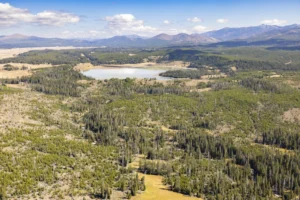Helpline Offers Support to Farmers, Ranchers in the Face of Uncertainty
Those in the industry in Wyoming can find a friendly ear through the AgriStress Helpline
- Published In: Other News & Features
- Last Updated: Dec 06, 2022

By Kristi Eaton
Special to the Wyoming Truth
When there was a suicide within the agricultural community of Kaycee about six years ago, the community came together and created Alliance for Hope, a suicide prevention organization.
“Our goal was to try to involve as many groups as we could,” Hugh Turk, a 60-year-old rancher and the group’s cofounder, told the Wyoming Truth.

Now, Turk and others have another tool at their fingertips to shore up mental health among the farming and ranching community: The AgriStress Helpline, a free and confidential phone and text support line for those who work in the industry or those who have a friend or loved one in the industry.
While 988 also is a crisis prevention hotline, AgriStress is staffed with specialists trained in the culture, values, stressors and lived experiences of agriculture, forestry and fishing workers. The number to call or text is 833-897-2474.
“First and foremost, this is a crisis line,” said Tara Haskins, lead for the AgriStress Response Network, based in Peosta, Iowa. “And so any individual calling, if they are having thoughts of suicide, wanting to give up being hopeless, helpless, we wanted that to be the priority.”
The line accepts calls in 60 languages. Since launching in five states earlier this year, including Wyoming, the line has handled over 210 contacts, the majority being phone calls, Haskins said. The helpline is supported by the local departments of agriculture in each state where it’s located.
Every caller receives a suicide assessment or some type of interaction with a call staffer, and if necessary, 911 can be deployed.
Next come resources that are tailored to the individual. “You can’t just throw everything in the kitchen sink with them,” Haskins added. “So you have to meet them where they are, see what their needs are.”
Unique difficulties of Wyoming ag
For those working in Wyoming agriculture, some crisis-inducing issues include questions about maintaining a livelihood farming or ranching, the impact of weather changes, production lines, zoonotic diseases and avian flu outbreaks, Haskins said.
“The work of agriculture is hard, and it doesn’t give up,” she added. “For some individuals, it’s 24/7, particularly depending on what kind of production you are. If it’s seasonal, the work may change across seasons, but it can be really hard, particularly up in Wyoming.”
Bill Hawley, Community Prevention Manager at Johnson County Public Health, which addresses substance abuse and suicide, is pleased that state leaders recognize the unique difficulties facing ag producers.
“By offering the helpline, we can offer a specific resource for our ranchers and farmers to deal with and work through their difficulties in a healthy way,” he said.

Hawley, co-founder of Alliance for Hope, said that the ag producers he knows live in a constant state of uncertainty about the economy, weather patterns and future of their family ranches—all of which creates stress and impacts their brain health.
Kristi Lipp, Community Prevention Specialist at Weston County Health Services, has firsthand experience with the agriculture industry, having grown up watching her dad work on ranches in northern Campbell County. Lipp’s daughter is a freshman ag-business/ag communications major at Northwest College in Powell, while her 16-year-old son has a small cattle herd and is a junior at Newcastle High School in Newcastle. Both are members of Newcastle Saddle and Sirloin FFA Chapter.
“Quite honestly, [ag producers] rely a great deal on faith,” Lipp said. “There is no way to predict what the cost of fuel will be or what the grain or livestock prices will be when it’s time to buy or sell. They can’t control the weather, which has a huge impact on everything agricultural. Many of our Wyoming ag families are trying to hold on to a piece of their family history by keeping their farm or ranch in production. And that, in and of itself, can be a burden.”
Lipp said many ag families have jobs outside of the industry to make ends meet. That, coupled with daily struggles in life, can cause immense stress, she added.
While mental health among agriculturalists is receiving more public attention, Lipp believes there is more that can be done, including programs like AgriStress.
In general, she said, society as a whole is talking more about mental health and sharing resources that are available.
“We are also raising young agriculturalists who understand that talking about mental health is OK,” Lipp said.
In Weston County, the County Health Service is working with local FFA chapters to distribute the AgriStress Helpline information and resources to local agencies and businesses that serve the agriculture community.
“Our goal is for the information to be available for those that need it at the places that they frequent the most. The tools and resources are great, but people have to know they are out there,” Lipp said.
For Turk, greater awareness comes from helping dispel myths around the struggles some may feel at times.
“People are starting to be aware that the ‘cowboy up’ works for a lot of things, but it doesn’t work for mental health problems,” he said. “And, ultimately, the best solution for this stuff is information.”













